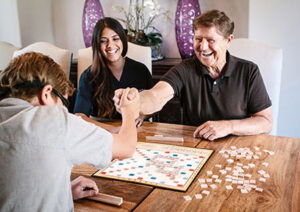As more and more family members are coming to know, caring for an aging loved one with Alzheimer’s or another type of dementia is challenging—and becomes more so as the disease progresses through various stages. When a senior loved one is diagnosed with Alzheimer’s disease, the task can seem nearly impossible for even the best of caregivers. It’s difficult to know the person you are very close to may lose the ability to remember your name or worse recognize you.
Susan Benedetto, the wife of 95-year-old music legend Tony Bennett, last year revealed that he has been living with Alzheimer’s since his 2017 diagnosis yet he doesn’t know that he has it. Ms. Benedetto shared that he still remembers her, his children and song lyrics, but last August he gave his final public performance in a concert at Radio City Music Hall with Lady Gaga. This year, Ms. Benedetto and Mr. Bennett have stepped into the role of Alzheimer’s research advocates by participating in this month’s Go Purple and The Longest Day on June 21st campaigns established by the Alzheimer’s Association.
We face a true battle in the fight to end Alzheimer’s. A CDC study estimates that by 2060, nearly 14 million people or about 3.3 percent of the nation’s population, will have Alzheimer’s disease or a related dementia. With June being Alzheimer’s & Brain Awareness Month, here are some general guidelines intended to help you better understand this progressive disease and how its symptoms might express themselves in a senior loved one.
What is Alzheimer’s Disease?
Alzheimer’s disease is the most common form of dementia, a general term for cognitive decline and memory loss. It affects memory, thinking, and behavior. While the progressive cognitive decline is devastating, the most upsetting part of Alzheimer’s is it is currently irreversible.
- As of this year, Alzheimer’s is ranked as the seventh leading cause of death in the United States and is the most common cause of dementia among older adults.
- Those diagnosed with Alzheimer’s live an average of eight years after symptoms have become noticeable.
- According to the Alzheimer’s Association, a person with Alzheimer’s lives four to eight years on average after diagnosis but can live as long as 20 years.
- Changes in the brain related to Alzheimer’s begin years before there are any signs of the disease.
- Those with Alzheimer’s still experience joy and happiness, despite their increased confused state.
Knowing if Someone Has Alzheimer’s Disease
Severe memory loss is never a normal part of aging. If you notice any of the following signs in yourself or a senior loved one, be sure to seek medical advice. Here are 10 signs of Alzheimer’s disease according to the Alzheimer’s Association:
- Memory loss that disrupts daily life
- Challenges in planning and/or problem-solving
- Difficulty completing everyday tasks
- Confusing times and/or places
- Trouble understanding images and spatial relationships
- Problems with words when speaking and writing
- Misplacing things
- Decreased/ poor judgment
- Withdrawal from work and/or social activities
- Changes in mood and/or personality
Caring Through the Stages of Alzheimer’s Disease
The intellectual impairment progresses gradually from occasional forgetfulness to complete disability. At first, the person may seem a little forgetful. Then, they may have more difficulty learning new skills or even speaking. As the disease advances, the job becomes more and more demanding.
With that being said, it’s important to remember even though Alzheimer’s disease can’t be stopped, there is a lot you can do to improve the overall quality of life of both you and the person suffering. By understanding how Alzheimer’s advances, you will be able to adapt and prepare for inevitable.
Mid-Alzheimer’s disease (early stage)
The early stage of Alzheimer’s is referred to as “mid-Alzheimer’s disease” or early stage. This stage is the most difficult to recognize. Failing to remember appointments and conversations have just happened in as little as a few hours ago can be a red flag.
If your loved one has just been diagnosed with Alzheimer’s disease, one of the most important things you can do for them is to get informed. The more you know about the disease, the more you will be able to understand what they are going through. When you have a better comprehension of the disease, you will be able to manage their care better. You will be able to see why they are acting the way they are and will be more likely to cope with the enhanced level of patience your new role requires of you.
During this early stage, you should focus on maximizing their independence. You can accomplish this by supporting them in their decisions, providing the necessary companionship, and helping them prepare for their future. Taking the initiative to learn and prepare will help you overcome if not avoid many of the potential obstacles this diagnosis comes with.
For example, knowing a common side effect of Alzheimer’s is aggression can go a long way. If your loved one becomes aggressive for seemingly no reason, you will be able to internalize it better. You will know it’s part of the disease, and you won’t take it personally. Knowing why something is happening can only benefit you and your loved one.
Moderate Alzheimer’s Disease (middle stage)
The middle stage is called “moderate Alzheimer’s disease.” It is the longest stage and also requires the most flexibility on your end as a caregiver. You will likely notice your loved one has more difficulty with words and they may get frustrated more easily. They may also refuse to do tasks they find unappealing. This includes tasks such as bathing, which often becomes more of an ordeal as the disease progresses.
The care you provide is going to more demanding and require lots a patience. Give your loved one as much structure as possible and be prepared to adjust the parts of the routine that are not working.
Severe Alzheimer’s Disease (late stage)
The final stage of Alzheimer’s disease undoubtedly is the most challenging. During this stage, your senior loved one may have difficulty doing basic tasks such as eating and swallowing. They will need around-the-clock care and you will likely need help. You should take extra precautions to ensure your loved one is not in pain because they may have difficulty communicating it with you.
During this stage, you should take extra precautions to ensure your loved one is not in pain because they may have difficulty communicating it with you. At this point, much of your loved one’s life is being experienced through senses, meaning touch, sound, taste, sight, and smell. For this reason, you can care for them by directly targeting these senses. For example, you can read to them, play music for them, and make them their favorite foods.
But most importantly, the care you provide should focus on preserving their quality of life and dignity. A professional caregiver who has training and experience in providing at-home assistance to a senior Alzheimer’s patient can provide the support needed to achieve this and offer respite to family caregivers. If you would like to know more about how a trained Amada caregiver can help, please don’t hesitate to call 866-752-1961 or visit the Amada Home Care Locations page to find a franchise office near you.
Help for a Senior Loved One Diagnosed with Alzheimer’s
Feelings of shame or hopelessness can cause people to resist getting diagnosed or even refuse treatment, says Sarah Lock, AARP’s senior vice president for policy and brain health. And though there is no cure for Alzheimer’s, seniors can take steps to delay symptoms and improve their quality of life. According to the Global Council on Brain Health, these six behaviors can perhaps delay the onset of Alzheimer’s or ease its stages:
- Maintaining social ties
- Challenging the brain
- Managing stress
- Exercising regularly
- Eating right
- Getting restorative sleep
Remembering to Care for Yourself
Remembering to care for yourself is one of the things caregivers often need to be reminded of. It is easy to get caught up in all the responsibilities you have while caring for someone with Alzheimer’s disease, but if you are not well taken care of, you will not be able to provide the care your loved one deserves. When this happens, it may cause you to feel as though you are falling short and thus adding to the stress you already feel. Stress can cause you to do and behave in ways you normally would have. It even causes you to take out your frustration on the person you are caring for—which will only worsen the problem. Never neglect to take time off and accept help when you need it.
“Understanding Alzheimer’s and Supporting a Senior Alzheimer’s Patient,” was written by Ashley LeVine and updated by Michelle Flores, Amada Blog contributors.















